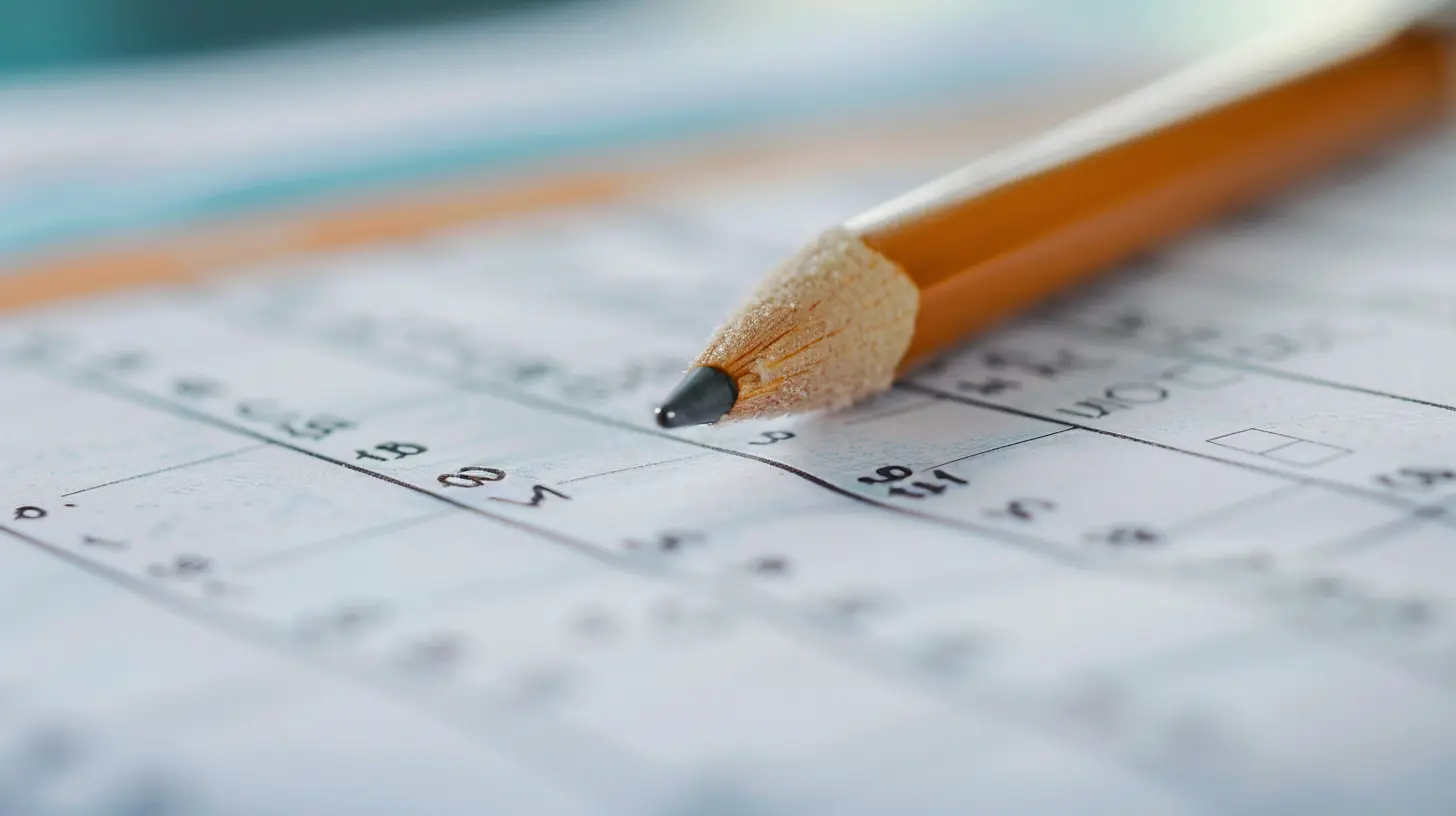How to Set Realistic Goals for Your Study Sessions
21 January 2025
When it comes to studying, one of the biggest challenges isn't just sitting down with your books or notes—it's figuring out what to tackle and how to do it effectively. We’ve all been there, right? You decide to study for a few hours, but by the time you're done, you realize you didn’t get much done at all. Frustrating, isn’t it?
The secret to productive study sessions lies in setting realistic goals. Just like how athletes train with specific targets in mind, or how chefs follow a recipe to create the perfect dish, you need a plan to make the most of your study time. And no, it doesn’t have to be complicated. Let’s walk through how you can set realistic goals for your study sessions and actually stick to them.

Why Setting Study Goals Is Important
Before we jump into the "how," let's figure out the "why." Why should you bother setting study goals in the first place? Isn’t just sitting down and reading enough?Well, not exactly.
When you study without clear goals, you can easily lose focus or get overwhelmed with the sheer amount of material. It’s like trying to go on a road trip without a map—you’ll end up driving in circles.
Setting study goals helps you:
- Stay focused: You know exactly what you're working on.
- Track your progress: You can see how much you've accomplished.
- Avoid burnout: Clear goals prevent you from cramming too much at once.
- Boost motivation: Each time you achieve a goal, it feels like a mini win.
It’s all about working smarter, not harder!

Step 1: Break Your Study Material Into Manageable Chunks
The first step in setting realistic goals is breaking your study material into smaller, digestible parts. Imagine trying to eat a whole pizza in one bite. Impossible, right? Studying is no different. If you try to "consume" too much information at once, you'll feel overwhelmed, and nothing will stick.How to Break It Down:
- Divide by chapters or sections: For textbooks, break your material down by chapters or sections.- Use topics or themes: If you're studying for an exam, divide your study sessions according to the key topics that will be covered.
- Set time limits: Instead of saying, "I’ll study biology today," say, "I’ll study photosynthesis for 45 minutes, then take a break."
By breaking things down, you’re not looking at a huge mountain of work—you’re looking at small hills. Much easier to climb!

Step 2: Set SMART Goals
Now that you’ve broken your study material into chunks, it’s time to set goals. But not just any goals—SMART goals. Have you heard of them? They’re a game-changer.What Are SMART Goals?
SMART stands for:- Specific
- Measurable
- Attainable
- Relevant
- Time-bound
Let’s break that down:
- Specific: Don’t just say, “I need to study.” Be specific—what exactly do you want to accomplish? For example, “I want to review 10 Spanish vocabulary words.”
- Measurable: Make sure you can measure your progress. Can you say, “I’ve reviewed 5 out of 10 words”? That’s measurable.
- Attainable: Be realistic. Don’t set a goal to study 10 chapters in one hour. You’ll just stress yourself out. Start small and build up.
- Relevant: Your study goals should align with what you actually need to learn. If your exam is in math, don’t waste time reading unrelated history notes.
- Time-bound: Give yourself a deadline. “I’ll finish reviewing these 10 words in the next 30 minutes.”
Example of a SMART Study Goal:
- Not SMART: “I want to study chemistry tonight.”- SMART: “I will review the periodic table and memorize 15 elements in the next 45 minutes.”
Setting SMART goals helps keep you on track and makes the process feel less daunting.

Step 3: Prioritize Your Tasks
Not all study goals are created equal. Some things are more urgent or difficult than others. So, after setting your goals, it’s important to prioritize them. Think of it like packing for a trip. You wouldn’t pack your shoes before your passport, right?How to Prioritize:
- Use the Eisenhower Matrix: This is a simple tool to help you sort tasks by urgency and importance. Split tasks into four categories: 1. Urgent and important
2. Not urgent but important
3. Urgent but not important
4. Neither urgent nor important
Focus on the tasks in the first two categories.
- Tackle tough subjects first: Start with the subjects that are the hardest for you. Your brain is fresh at the beginning of your study session, so it's the best time to handle the difficult stuff.
- Check for deadlines: If you have an assignment due soon, prioritize studying for that class.
Step 4: Set Short-Term and Long-Term Goals
It’s important to have both short-term and long-term goals when it comes to studying. Why? Because they serve different purposes.Short-Term Goals
These are the goals that you set for each study session. They should be achievable in a short amount of time. Think of them as stepping stones. For example:- “I want to review my class notes for 30 minutes.”
- “I will complete half of my math homework in the next hour.”
Long-Term Goals
Long-term goals are the bigger picture. These are the goals that span over weeks or months. For example:- “I want to finish reading my entire history textbook by the end of the semester.”
- “I aim to improve my math grade by 10% by the next exam.”
Long-term goals help you stay focused on the big picture, while short-term goals keep you grounded day-to-day.
Step 5: Be Flexible and Adjust as Needed
Here’s the thing: life happens. Maybe you had planned to study for two hours, but something came up. Or maybe you realized that understanding quantum physics in one session was a bit too ambitious.And that’s okay!
Adjusting Your Goals:
- Reassess: If you’re consistently not meeting your goals, it may be time to reassess. Are you being too ambitious? Do you need more time for certain topics?- Stay flexible: If a study method isn’t working for you, switch it up! Try different techniques like flashcards, summarizing, or teaching the material to someone else.
- Celebrate the small wins: Even if you didn’t meet your entire goal, celebrate what you did accomplish. Progress is progress, no matter how small!
Remember, your goals are there to guide you, not stress you out. It’s about finding what works for you.
Step 6: Create a Study Schedule
Once you’ve set your goals, it’s time to figure out when to tackle them. A study schedule can help you stay organized and ensure that you’re dedicating enough time to each subject or topic.Making a Study Schedule:
- Use time blocks: Dedicate specific time blocks to each subject. For example, “Math from 2-3 PM” and “English from 3:30-4:30 PM.”- Include breaks: Don’t forget to schedule short breaks to recharge. The Pomodoro Technique (25 minutes of work followed by a 5-minute break) is a popular approach for this.
- Be realistic: Don’t overload your schedule. Make sure it’s something you can stick to.
Digital Tools to Help:
There are plenty of apps that can help you create and stick to a study schedule, like:- Google Calendar: Simple and easy to use.
- Trello: Great for visual learners who like organizing tasks with boards and lists.
- Notion: A powerful all-in-one tool for keeping track of goals, tasks, and schedules.
Step 7: Track Your Progress
How will you know if you’re improving if you don’t track your progress? Keeping track of what you’ve accomplished is a great way to stay motivated and see how much you’ve learned.Ways to Track Your Progress:
- Keep a study journal: Write down what you accomplished after each study session.- Use habit trackers: Some apps allow you to track how many days you’ve studied or completed certain tasks.
- Review: At the end of each week, review what goals you met and what you can improve on for the next week.
Conclusion
Setting realistic goals for your study sessions doesn’t have to be complex, but it does require some planning. By breaking your material into manageable chunks, using SMART goals, and prioritizing your tasks, you’ll be on your way to more productive and focused study sessions. And remember, flexibility is key! Adjust your goals as needed and celebrate every bit of progress along the way. Whether you're preparing for exams, working on assignments, or just trying to get through your daily readings, realistic goals can help you stay on track and make the most of your time.Happy studying!
all images in this post were generated using AI tools
Category:
Test PreparationAuthor:

Olivia Chapman
Discussion
rate this article
17 comments
Amy McPhail
Great tips! Setting small, achievable goals makes studying so much less overwhelming!
February 9, 2025 at 6:01 AM

Olivia Chapman
Thank you! I’m glad you found them helpful. Small goals can truly make a big difference in staying motivated!
Karina Vance
Setting realistic goals transforms study sessions from overwhelming marathons into manageable sprints. Embrace the power of bite-sized objectives; they not only boost productivity but also keep motivation alive. Small wins pave the path to big achievements!
February 1, 2025 at 5:10 AM

Olivia Chapman
Thank you for your insightful comment! I completely agree—breaking goals into smaller, achievable tasks truly enhances productivity and motivation in study sessions. Small wins indeed lead to larger successes!
June McCallum
This article provides valuable insights into setting realistic study goals. By emphasizing the importance of specificity, measurability, and time management, it equips learners with practical strategies to enhance focus and productivity. Implementing these techniques can transform study habits and lead to greater academic success.
January 29, 2025 at 12:17 PM

Olivia Chapman
Thank you for your thoughtful comment! I'm glad to hear that you found the insights on specificity, measurability, and time management valuable for enhancing study habits. Wishing you great success in your academic journey!
Sabrina Gates
Great insights on goal-setting for study sessions! Practical tips that can truly enhance focus and productivity. Thank you!
January 28, 2025 at 12:39 PM

Olivia Chapman
Thank you for your kind words! I’m glad you found the tips helpful for enhancing focus and productivity in your study sessions.
Ranger Holland
Unlock the secrets of effective study sessions—dare to tread the path where ambition meets meticulous planning. What awaits?
January 27, 2025 at 12:27 PM

Olivia Chapman
Discover a balanced approach to studying that transforms ambition into achievable goals, paving the way for success!
Yasmeen Rosales
Dream big, but don’t forget to keep it real!
January 27, 2025 at 5:35 AM

Olivia Chapman
Absolutely! Balancing ambition with practicality is key to effective goal setting. Aim high, but stay grounded to ensure success!
Zephyra Erickson
Excited to redefine my goals!
January 26, 2025 at 5:46 AM

Olivia Chapman
That's great to hear! Redefining your goals can lead to greater focus and success in your studies. Good luck!
Katherine Baxter
Focus on achievable goals to maximize your study effectiveness!
January 25, 2025 at 10:03 PM

Olivia Chapman
Thank you for your insightful comment! Focusing on achievable goals is indeed key to enhancing study effectiveness and maintaining motivation.
Carly Kelly
This article effectively emphasizes the importance of setting realistic goals for study sessions. By encouraging students to evaluate their capabilities and time constraints, it promotes a balanced approach that can enhance productivity and reduce anxiety, ultimately fostering a more positive learning experience.
January 25, 2025 at 12:02 PM

Olivia Chapman
Thank you for your thoughtful comment! I'm glad to hear that the article resonated with you and highlighted the importance of realistic goal-setting for a productive and positive study experience.
Yasmine McVey
Small steps lead to big successes!
January 24, 2025 at 8:18 PM

Olivia Chapman
Absolutely! Small, achievable goals keep you motivated and build momentum towards larger successes.
Nadine McGrath
Great article! Setting realistic goals is crucial for effective study sessions. I appreciate the practical tips on breaking tasks down and prioritizing them. This approach not only enhances productivity but also helps maintain motivation. I’m excited to apply these strategies to my own study routine. Thank you for sharing!
January 24, 2025 at 1:33 PM

Olivia Chapman
Thank you for your kind words! I'm glad you found the tips helpful and are excited to apply them. Best of luck with your study routine!
Jemima Stewart
Setting realistic study goals enhances focus and productivity. Break tasks into manageable chunks, and celebrate small achievements to stay motivated.
January 23, 2025 at 8:42 PM

Olivia Chapman
Thank you for your valuable insights! Breaking tasks down and celebrating progress are indeed key strategies for maintaining motivation and enhancing productivity in study sessions.
Quill Myers
Setting realistic study goals enhances productivity and focus. Start small by breaking tasks into manageable chunks, prioritize your objectives, and establish a consistent routine. Adjust your goals as needed to stay motivated and ensure steady progress. Happy studying!
January 23, 2025 at 12:03 PM

Olivia Chapman
Thank you for your insightful comment! Breaking tasks down and prioritizing really does make a difference in maintaining motivation and focus. Happy studying to you too!
Tamara Coleman
Setting realistic goals for study sessions isn’t just about time management; it’s a reflection of self-awareness and adaptability. Embracing the journey of learning, rather than merely the outcome, fosters resilience and nurtures a deeper understanding of one’s own potential.
January 23, 2025 at 3:31 AM

Olivia Chapman
Thank you for your insightful comment! Emphasizing self-awareness and adaptability truly enhances the study experience and promotes resilience in learning.
Natalia McQuiston
Setting realistic goals is essential for maintaining motivation and mental well-being in your study journey. Remember, it's okay to adjust your goals as needed. Be kind to yourself, celebrate small achievements, and focus on progress rather than perfection. You've got this!
January 22, 2025 at 9:48 PM

Olivia Chapman
Thank you for your insightful comment! I completely agree—adjusting goals and celebrating small wins is key to sustaining motivation and well-being. Let's embrace progress together!
Ivan Jimenez
This article offers invaluable insights on setting achievable study goals. By breaking down tasks and prioritizing effectively, students can enhance their focus and motivation. Realistic goals not only streamline study sessions but also foster a sense of accomplishment. Highly recommend!
January 22, 2025 at 11:30 AM

Olivia Chapman
Thank you for your kind words! I'm glad you found the insights helpful for setting achievable study goals. Your support means a lot!
Shannon Meyers
Great tips! Setting achievable goals matters!
January 21, 2025 at 3:50 AM

Olivia Chapman
Thank you! I'm glad you found the tips helpful. Setting realistic goals is key to staying motivated and making progress!
MORE POSTS

How to Manage Your Time During a Timed Exam

The Importance of Creating a Study Schedule You Can Actually Follow

How to Differentiate Instruction in a Flipped Classroom

Using Media to Foster Cultural Awareness in Students

Differentiating Instruction for Kinesthetic Learners

Collaborative Learning Models in the Digital Age

How to Use Formative Assessments for Student Success

Differentiation for Introverted and Extroverted Learners: Finding Balance

How to Use Found Objects in Art Lessons for Sustainability Awareness

How to Use the Pomodoro Technique for Efficient Studying

Study Smarter, Not Harder: Techniques for Efficient Learning